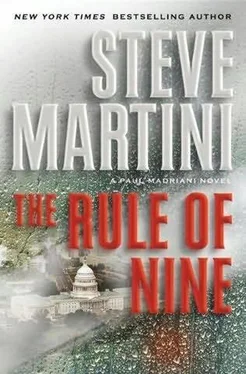Janice is my secretary. Somebody waiting in the office catches my attention since I don’t have any appointments on my calendar for this afternoon.
“Who is he?”
“I don’t know who he is,” says Harry, “but he’s insistent. When Janice told him you might not be back for the rest of the day, he apparently planted himself in one of the chairs in the outer office and told her he’d wait.”
Ever since the events in Coronado and the warning from Thorpe, I get edgy when visitors show up at the office unannounced. “What did he look like, did you see him?”
“Tall, lanky, sunny side of fifty maybe, well dressed, suit and tie, dark…” Harry’s gaze rises as he talks to me. “Speak of the devil.”
Before I can turn, a shadow settles across my shoulder and onto the table in front of me.
“Are you Paul Madriani?”
I look up and he is silhouetted against the bright daylight from the window behind me. The stupid things that race through your mind at a moment like this. His face has the shadowed clarity of the dark side of the moon. I find myself looking down toward his hands to see if they’re packing anything.
“Who’s asking?”
“My name is Bart Snyder. I think you may have known my son, James.”
Zeb Thorpe stormed into the small conference room at FBI headquarters like a man running on afterburners. “Gentlemen. Sorry to be so late.” He had been racing all day through a series of meetings. This one had been dropped on his calendar at the last minute in a telephone call from his assistant, Ray Zink, with no time to talk-only a message that it was urgent.
“I take it everybody’s here?” Besides Zink there were only two others present, an air force officer sporting brass birds on the epaulets of his dress jacket, and another man, a civilian Thorpe didn’t recognize.
He moved at speed toward the head of the table, took his seat, and opened the file in front of him. Thorpe started to scan the file as he talked.
“Hope this won’t take too long. I’ve got a dinner meeting with the director in a little over an hour. And somehow between here and there I have to struggle into a tux that’s down in my car.” He looked at a photograph in the file, a large military transport plane parked on a tarmac, its cargo ramp down and the rear bay open. “You want to do introductions or should we just get started?”
“Greg Sanchez, National Security Agency.” This from the man in the suit at the other end of the table. He looked to be in his early thirties, with short dark hair and intense eyes.
NSA operated out of a set of glass towers at Fort Meade, in Maryland.
“I don’t think we’ve met before. What division at NSA?”
“Infosec, international relations.”
“That covers a lot of sins,” said Thorpe. “How long you been out of the navy?”
“Is it that obvious?” said Sanchez.
“Lucky guess,” said Thorpe.
“Two years.”
“When you see George Simmels, tell him Jughead says hello.” Simmels was Sanchez’s boss. He was an old salt who never hired anybody who hadn’t first paid his dues bounding on the main. He and Thorpe, a former marine, went back almost twenty years.
Thorpe also knew that Simmels was soon for retirement, whether he wanted it or not. For decades the navy held a firm edge in the field of encryption, code making and breaking. Throughout the Cold War this was the NSA’s fundamental mission. But no longer. That had all changed with the attack on 9/11. Now the NSA’s job was to read everybody’s e-mail and listen to their telephone communications, or at least as many of them as could be sucked out of the ether by the supercomputers at Fort Meade. The job was to scan it all, searching for the code words of terrorism. On that score the air force held the whip hand. They controlled most of the critical communications satellites.
“Sir, I’m Colonel Nelson Winget.” The man in the uniform slid a business card down the table toward Thorpe.
“You can call me Thorpe, Zeb, anything but sir,” said Thorpe. “That one’s reserved for my five-year-old grandson and only when he knows he’s been really bad.” He looked at the business card: ASSISTANT COMMANDER, AIR FORCE SYSTEMS COMMAND, WRIGHT-PATTERSON AIR FORCE BASE. “Who wants to start?”
Zink jumped into the void. “The plane in the file photo is Russian made, an IL-76, registered in the Georgian Republic. As to who owns it, it’s anybody’s guess. Title seems to be a bit cloudy. The aircrew is a mixed bag, three of them out of Belarus, and one Chechen. They were flying out of North Korea. The plane was forced down by mechanical problems and landed at Don Muang airport in Bangkok two days ago. Thai authorities found thirty-five tons of arms and munitions on board, all of it in violation of the UN Security Council ban on exports from North Korea.”
“And who says serendipity never works for our side?” said Thorpe.
“We did tip off Thai customs as to what we thought was on board,” said Sanchez.
“You don’t have to explain to me,” said Thorpe. “As long as they land outside the country and it doesn’t start a war, you got my vote. So far it sounds like an issue for the State Department or Defense, not us.” He started to close the cover on the file in front of him.
“We don’t know the intended final destination,” said Zink. “You can probably draw a big circle around the Middle East and throw darts at it.”
“But there appears to be a problem,” said Sanchez, “and if we’re right, it’s gonna likely fall in your court sooner or later.”
“Go on,” said Thorpe.
“Yesterday we intercepted telephonic communications between an individual in Pyongyang, North Korea, and someone in the area of the northern Caribbean,” said Sanchez. “They were using a satellite link we don’t control, part of the old Soviet system. And the receiving end in the Caribbean wasn’t using a cell phone. It was an old analog landline.”
“Cuba,” said Thorpe.
Sanchez nodded. “It gave us some problems with transcription since our computers and our software are weighted toward digital signals. So we didn’t get the entire conversation.”
“Was it encrypted?” said Thorpe.
“No. It was clear and in English,” said Sanchez. This meant it probably wasn’t the North Korean military or its government talking to their counterparts in Cuba.
“It appears to have been a private-party conversation. The transcript is in your file, the parts that we were able to pick up.”
Thorpe had the file open again and was turning pages until he found the transcript and started to read.
“The scanning software at one of our stations picked up the phone call because of the location from which the call originated, in North Korea. It became a full intercept when key words were recognized,” said Sanchez. “You’ll see those words highlighted in the transcript.”
“The man calling in from Pyongyang was reporting to his friend in Cuba that a certain cargo plane was forced down in the ‘land of smiles.’”
“Thailand,” said Thorpe.
“It was clear there was something on board they were interested in. The man at the Cuban end of the conversation seemed to be in charge. He was worried that the communication might be intercepted. They beat around the bush for a while and finally out came the words ‘big guy’ and ‘little kid,’” said Sanchez.
“And that’s when all the lights and buzzers on your computer went off.” Thorpe had already keyed on the highlighted words in the transcript.
“It’s not just words or phrases, but usage,” said Sanchez. “The way these words are employed in a conversation that triggers the computer to recognize them. They were among a number of similar words or phrases designed to capture a particular reference.”
Читать дальше












